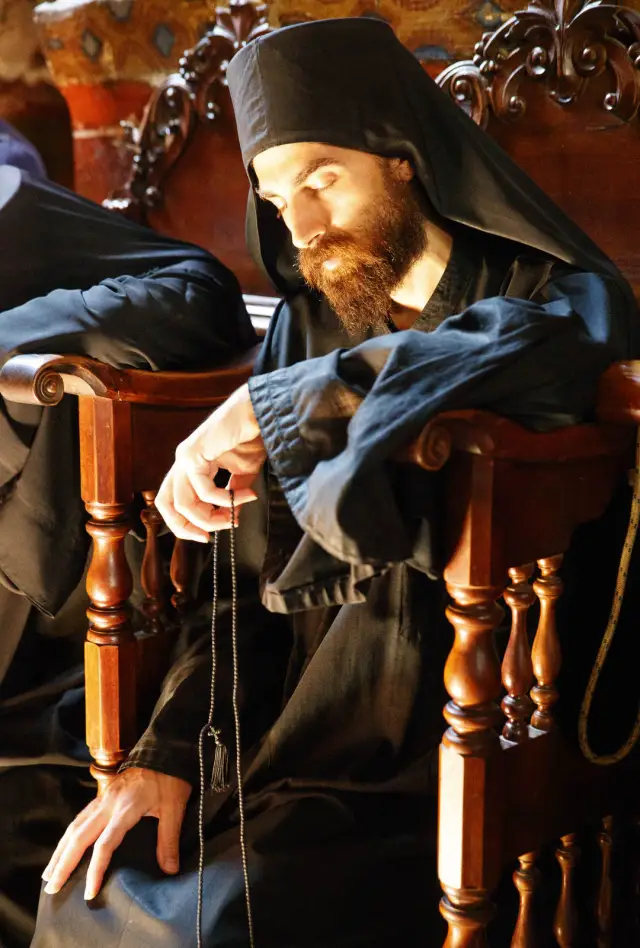 The Orthodox has many rules and directives for priests. One that I frequently violated was serving the Divine Liturgy from memory and not reading from the service book. The sacred services of the Church are quite beautiful and deeply rooted in Scripture as well as the writings of the Holy Fathers. The words and symbolic gestures used in the Divine Liturgy in particular recall for us the life of Christ and his salvific work for those who believe in Him. From the prothesis (proskomedia or offering preparation) which embodies the place (the cave) and time (Christmas) of the birth of Christ, through the Lord’s ascension and His promise to return represented by the blessing the faithful with the chalice after receiving the Eucharist – we are invited to participate in the truth that is Jesus Christ and the beauty that is the Orthodox Church.
The Orthodox has many rules and directives for priests. One that I frequently violated was serving the Divine Liturgy from memory and not reading from the service book. The sacred services of the Church are quite beautiful and deeply rooted in Scripture as well as the writings of the Holy Fathers. The words and symbolic gestures used in the Divine Liturgy in particular recall for us the life of Christ and his salvific work for those who believe in Him. From the prothesis (proskomedia or offering preparation) which embodies the place (the cave) and time (Christmas) of the birth of Christ, through the Lord’s ascension and His promise to return represented by the blessing the faithful with the chalice after receiving the Eucharist – we are invited to participate in the truth that is Jesus Christ and the beauty that is the Orthodox Church.
Because of the real human possibility of forgetting and leaving out an important word or phrase or uttering words that might be heretical and mislead the faithful, the Church prohibits her clergy from serving without a book of the scripted divine services. I love the Orthodox Divine Liturgy of St. John Chrysostom and felt so blessed to be able to celebrate it for the faithful. Very frequently I served with my eyes closed, chanting the petitions and praying the words commonly referred to as the “silent” prayers of the priest[1]. I felt a deep peace, my eyes undistracted and a solemn presence when I served in this manner. The words seemed to flow from my mind and heart to my lips.
While the Church recognizes the hazard of serving or praying from memory, with our eyes closed, I have often wondered what else we miss when we pray with our eyes closed. There is much misery, pain, and injustice in the world and indeed frequently in our own backyards. When we pray with our eyes closed it can be easier to not see, and therefore block out from our minds and hearts, the suffering of others and the weight of the despair of many of our brothers and sisters.
Living for a while in a big city it was relatively common to see homeless people and individuals asking for money for food. Many of us have learned how to walk quickly past those without shelter or sustenance, learning how to avoid eye contact, and later dismissing them as just wanting the money for drugs or alcohol. Friends have told me that the news in the world is just too depressing to read about or see on the nightly news, so they have decided not to read about or watch the atrocities happening to “others”. Anyway, there is nothing that we can really do to affect the lives of people so far away.
The same indifference or feelings of helplessness are present when we think about those the Orthodox Church frequently dismisses and scorns; those of us who are gay, lesbian, bisexual, or transgendered. The eyes of the Church and her faithful have for too long been closed to that portion of God’s creation that might be different from the other sheep. And yet, God in His infinite wisdom created all of us, white, brown, black, tall, short, blue-eyed, blonde, male, female, gay, and straight in His own image. I can no more change my sexual orientation than I can change my age. Such is the design of God.
What I can change is the way I view, treat, help, love, and pray for everyone I see, no matter how much I want to close my eyes and dismiss them; no matter how easy it is to ignore them or rationalize my response to their suffering. For too long this is what the Orthodox Church has done to its LGBT faithful – close their eyes and dismiss and condemn. I pray that we open our eyes and see all of God’s creation and do what Christ wants us to do – feed His sheep – not with platitudes of “prayers and thoughts” and a demand to change themselves before they are accepted or helped– but with an embrace, an open heart to what they need – and then offering such to them, without judgment.
[1] There is an active debate in Orthodox circles if these prayers are to be said “silently” by the priest or read aloud for the faithful to hear. I am persuaded by the read-aloud argument.

Thank you so very much for your kind comments. We are guided by the Holy Spirit to keep our eyes open to see need and respond.
This is a beautiful reflection. It is so important that all of us open our eyes to the suffering of people near and far, and to do our best to help these people.